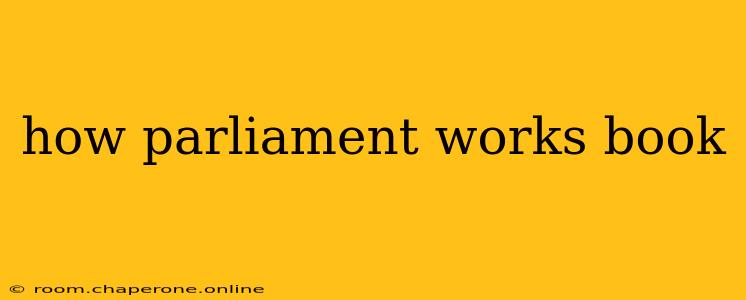Understanding how your parliament functions is crucial for any engaged citizen. This book isn't just about the mechanics; it's about the power dynamics, the historical context, and the impact on your daily life. Whether you're a seasoned political observer or a newcomer seeking to understand the legislative process, this guide provides a clear and insightful look into the intricacies of parliamentary systems.
What is Parliament?
At its core, parliament is the legislative branch of government, responsible for creating and amending laws. It's a forum for debate, deliberation, and the representation of the people. But the specifics vary greatly depending on the country. Some parliaments, like the UK's Westminster system, are bicameral—meaning they have two houses (a House of Commons and a House of Lords, for example). Others are unicameral, with a single legislative body.
This guide will primarily focus on the principles that apply across different parliamentary systems, highlighting key similarities and differences. We'll explore the diverse roles played by parliamentarians, the processes involved in creating legislation, and the mechanisms for holding the government accountable.
Key Roles within Parliament:
- Members of Parliament (MPs) or Members of the Legislative Assembly (MLAs): These are the elected representatives of the people, responsible for voicing their concerns and participating in the legislative process.
- The Government: Typically led by a Prime Minister or Premier, the government is responsible for proposing and implementing legislation.
- The Opposition: This group holds the government accountable, scrutinizing its actions and proposing alternative policies.
- Committee Members: MPs and Senators serve on committees that specialize in specific policy areas, conducting detailed scrutiny of legislation.
- Speakers/Presidents: The presiding officer in each chamber maintains order and ensures fair debate.
The Legislative Process: From Bill to Law
The journey of a bill—a proposed law—to becoming an act of parliament is often complex and multifaceted. This process, however, usually follows a similar pattern, irrespective of the specific parliamentary system:
1. First Reading:
This is a formality, introducing the bill to the house.
2. Second Reading:
The bill's general principles are debated and voted upon.
3. Committee Stage:
The bill is examined in detail by a committee, often clause by clause, with amendments proposed and debated.
4. Report Stage:
Any amendments made in committee are considered by the whole house.
5. Third Reading:
The final version of the bill is debated and voted upon.
6. Passage to the Other House (if bicameral):**
The bill proceeds to the other chamber of parliament, where the process is repeated.
7. Royal Assent (or equivalent):**
Once both houses have approved the bill, it receives formal approval from the head of state (e.g., a monarch or president), officially becoming an act of parliament.
Accountability and Scrutiny
Parliament isn't just a law-making body; it's a vital institution for holding the government accountable. This occurs through several mechanisms:
1. Question Period:
Regular sessions where MPs can question ministers about government policies and actions.
2. Debates:
Opportunities for MPs to debate important issues and scrutinize government proposals.
3. Committees:
Specialized committees investigate specific issues, examining government performance and making recommendations.
4. Budgetary Processes:
Parliament's control over government spending ensures accountability in the allocation of public funds.
The Future of Parliament
Parliamentary systems around the world face ongoing challenges, including declining public trust, the rise of populism, and the impact of social media. Understanding how these systems function, and their strengths and weaknesses, is critical for ensuring their ongoing relevance and effectiveness in representing the people's interests.
This book provides a fundamental overview, serving as a starting point for further exploration into the fascinating world of parliamentary politics. By understanding the complexities of this vital institution, citizens can actively participate in shaping the laws and policies that govern their lives.

